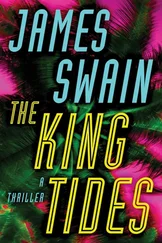. . .
Within an hour the full agony had come upon him and he dissolved into a pain both shattering and inexplicable, his body already a wreck of exhaustion and the pain continuing to crest toward its magnificent and destructive apex. He felt as if he was caught in some eventide between sleeping and waking, and in this gray semidarkness his mind seemed to fall toward the memory of Quinn, gravitating toward her as if her memory held within it a specific density greater than all others, the pull so strong and real that he felt an immediate impulse to rush into her room, as if now in the pain that was his crushed mind there was a chance that he could reach her. But Quinn was dead and nothing would change that. His eyes locked closed in the black heat under the sweat-soaked sheet and blanket and in the red darkness that was his pain.
During the long, impossible night even the undulating wave of chirping crickets had entered his mind and he closed the window and folded the pillow over his ears to muffle that sound but even then he was still able to feel it, a physical pressure just behind his eyes as if the sound was a grinding stone that had entered him and spun there against the front of his brain as he drifted into and out of consciousness, never sleeping but passing through a kind of gloaming that was memory and hallucination all at once, his vision, even with eyes closed, a collection of black and white zigzagging lines that covered everything, that covered even his thoughts until the final aleph of his pain was the form of a single question that repeated endlessly: Where was she now? Where was she now?
And as if in answer he could hear Barb’s voice somewhere in the room: “Can you hear me?” she said.
And his own voice responding as if it came from some other place entirely, as if he was someone else: “I can hear you,” he said.
“Oh, I can see you.”
He could feel himself floating, as if the bed and the room had dissolved around him. “I can see you too,” his voice said, somewhere. A pause. Then: “How … how are you?”
“I’m OK,” she said. Tears were already streaming down her face.
“It’ll be OK, Barb. We’ll be OK,” he heard himself say, his voice in the darkness speaking into his memories as if she could hear him. And so she could.
“I wish you were here,” she said.
“I know.”
“When can you come back?”
“I don’t know. They’re trying to get me down.”
“But when?”
“I don’t know yet. They’re trying. It’s hard to get back.”
There was the laptop with her face, the screen tilted at a slight angle. “I wish you weren’t there at all,” she said, sobbing. “None of this would have happened if you were here.”
There was a hollow space inside him, a vacancy, an abyss that was not filled with stars or with dark matter or with anything at all but was more like a black hole that had already drawn into itself the accumulated mass of whatever he was or had been or would be. Pain everywhere. He did not even know where he was anymore. In the empty bedroom? In his sleeping quarters on the ISS? His location shattered to the staggering electric wire of his pain.
“I want you to come home,” she said.
“I know you do,” he said. Silence from the screen. “Do you know any more about what happened?”
“I don’t know,” she said, her voice a high-pitched keening. “She was going too fast. She went to a party and she was going too fast on the way home.”
“Was she … had she been drinking or … anything?”
“No. They said no. Do you think she would do that?”
“I don’t know what she would do.”
“No, I guess you wouldn’t,” she said.
He said nothing. Floating but not floating. He could see her face on the laptop and the walls of his sleeping quarters and yet he could also see himself in the bed, a shattered agony drenched in sweat, stationary below him at the base of the room as if his form huddled in silence at the bottom of a cardboard box.
“Was it raining?” he said at last.
“Was it raining? I don’t know. No, it wasn’t raining. Why do you want to know if it was raining? What’s wrong with you?”
“Nothing,” he said. “I don’t know. You were there. I wasn’t there.” He breathed out, his carbon dioxide flowing into the tiny space of his sleeping quarters and into the vents and then being scrubbed back into oxygen again via the nitrogen tank he had installed. Recycling their breath again and again, forever. “She was my daughter too,” he said. The empty room in the house in the cul-de-sac was drifting through the microgravity now, was not drifting, was anchored to Earth, was loose of it again. My god.
“I know that,” she said.
“I want to know what happened.”
“I told you what I know.”
“What car was she driving?”
“Yours,” she said.
“Mine,” he said. It was not a question.
“Yeah,” she said.
“Oh.” The station’s dull and constant hum around him. Then: “She hit a tree?”
“A big tree in someone’s yard.”
“What kind of tree?”
“What? I don’t know what kind of tree.”
A long pause as he listened to the constant erratic engine of her breath. “What happened, Barb?”
“What do you want me to say, Keith?”
“I want you to tell me what happened.”
“I am telling you what happened,” she said. “The car hit the tree. She went through the windshield. She’s dead. She’s dead, Keith. Our baby’s dead. Oh Jesus. Oh Jesus,” her voice devolving into an inarticulate moan.
He floated in front of the laptop in silence. There were no tears. There was no feeling, only that sense of hollowed-out emptiness. The woman on the screen might have been anyone: a stranger, a distant relative, someone he had known long ago but had since forgotten.
“It’s OK,” he said. “Everything’s going to be OK.”
“How can you say that?” she said.
“I’ll be there as soon as I can,” he said. “They’re working on it. I’ll be there soon.”
“Please get here,” she said. “I need you here.”
“They’re trying.”
Her face silent on the screen, her eyes staring at him, mascara smeared into a gray blur. She started to speak again, her mouth moving, but the sound came in jagged bursts, cutting in and out so that he could hear only bits and pieces, single syllables, the image on the screen freezing and then moving and then freezing again, like a collection of still images strung together. “Barb, I can’t hear you,” he said. “Can you still hear me?”
There was no answer from her save the syllabic bursts of sound. Her face continued its broken, jerking motion and he floated in the room before it, watching her face as it spluttered into digital chaos and then froze altogether.
“We’ll try to reconnect,” Mission Control said from the intercom.
“No need,” he said.
“Are you sure?”
“I’m sure. We’re done.”
A few more words and then silence and he drew the curtain closed across the narrow doorway to his compartment and thought that he should probably weep, that this would be the time to do so, but no such tears would come to him and so he floated in the quiet half darkness of the sleeping compartment, staring at the blank screen of the laptop and then at the blank emptiness of the fabric wall.
. . .
His first migraine had occurred three days after that call with Barb, three days after he had learned of Quinn’s death. Apart from the silence that seemed to cling to him, the intervening days were as regular and normal as any other. His fellow crew members said almost nothing to him that was not directly related to the various experiments and projects they were working on, but he busied himself with his work, with the specific manipulation of numbers and metal and electricity, turning objects over in the microgravity and recording the data in the journal on his laptop and sending that information down to the ground, no one interrupting him, no one talking to him at all.
Читать дальше












